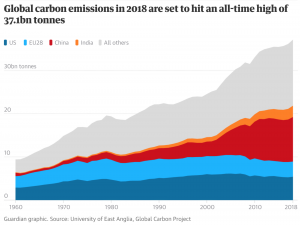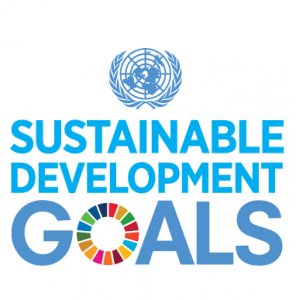All week I’ve keenly followed week 1 of COP24 through reading my fellow colleagues’ daily updates at the COP, watching both the live stream and on-demand recordings, reading as many tweets from the negotiations as possible, and reading newsletter coverage of the negotiations. Katowice, historically known for its coal mining and industry, was chosen as the destination for this year’s COP to change the narrative and signify the necessary shift away from fossil fuels, specifically coal.
Before even departing for Poland, keeping up with the COP24 has me awestruck. Celebrity activists such as David Attenborough and Arnold Schwarzenegger called for increased climate action and ambition. A speech given by COP24 superstar Greta Thunberg (age 15, pictured on the right) was particularly special. Greta Thunberg is a climate activist who sat on the steps of the Swedish Parliament demanding for more climate action and divestment from fossil fuels leading up to the Swedish election. She called for a systemic change, regardless of politics, in order to secure a future for generations to come and warned that we are running out of time. Greta gave her speech next to not only the Executive Secretary of the UNFCCC, Christiana Figueres, but also the Secretary General of the UN, António Guterres (both pictured above).
At the Pre-2020 Global Stocktake Technical Part, I was (unfortunately) not surprised when Saudi Arabia called for the deletion of the term “ambition mechanism” in the Global Stocktake text despite the urgent need for increased climate ambition called for by both the Paris Agreement and the IPCC 1.5˚C Special Report. The news of insufficient climate action continued with the release of a report by the Global Carbon Project, such that this Global Carbon Budget 2018 data can serve as a “balance sheet” in the future.
On the sub-national side, I attended a webinar hosted by the Center for Climate and Energy Solutions (C2ES) on “Energy Efficient Cities: Lessons from Public-Private Initiatives” where Duke Energy highlighted a particularly interesting Public-Private Partnership (PPP) initiative with the city of Charlotte, NC, on a community-based project for increasing smart technology access to increase energy efficiency savings. Another top US utilities company, Xcel, has committed to going 100% carbon-free by 2050, 80% carbon free by 2030, a huge ambitious commitment. I hope more companies, cities, and parties will make commitments to reduce their carbon emissions during the rest of COP24, and transparently report their progress towards these goals.
At all levels, there is buzz on the COP and future of climate change. As I pack for my flight to Katowice tomorrow morning, I am filled with cautious optimism that the parties will reach an agreement on the Paris Rulebook. At COP24, I will be working for the Business Council for Sustainable Energy (BCSE) and following transparency, sub-national action, advancement of the SDGs, and the Talanoa Dialogue.



